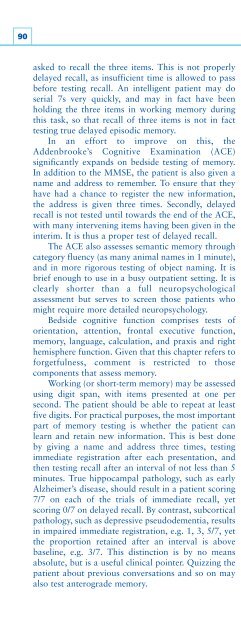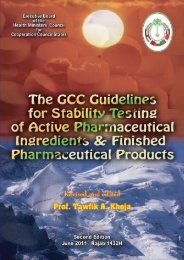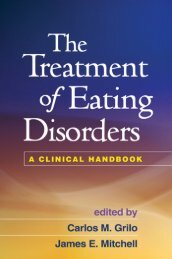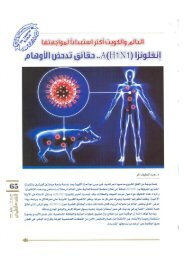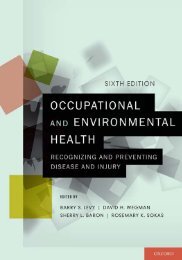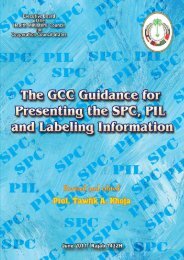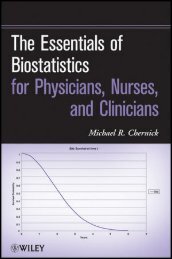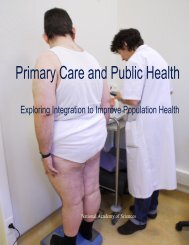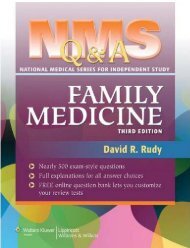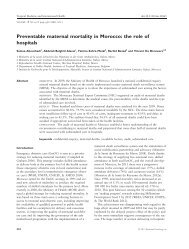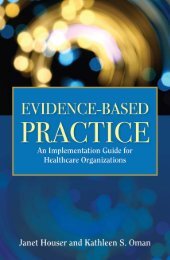You also want an ePaper? Increase the reach of your titles
YUMPU automatically turns print PDFs into web optimized ePapers that Google loves.
90asked to recall the three items. This is not properlydelayed recall, as insufficient time is allowed to passbefore testing recall. An intelligent patient may doserial 7s very quickly, and may in fact have beenholding the three items in working memory duringthis task, so that recall of three items is not in facttesting true delayed episodic memory.In an effort to improve on this, theAddenbrooke’s Cognitive Examination (ACE)significantly expands on bedside testing of memory.In addition to the MMSE, the patient is also given aname and address to remember. To ensure that theyhave had a chance to register the new information,the address is given three times. Secondly, delayedrecall is not tested until towards the end of the ACE,with many intervening items having been given in theinterim. It is thus a proper test of delayed recall.The ACE also assesses semantic memory throughcategory fluency (as many animal names in 1 minute),and in more rigorous testing of object naming. It isbrief enough to use in a busy outpatient setting. It isclearly shorter than a full neuropsychologicalassessment but serves to screen those patients whomight require more detailed neuropsychology.Bedside cognitive function comprises tests oforientation, attention, frontal executive function,memory, language, calculation, and praxis and righthemisphere function. Given that this chapter refers toforgetfulness, comment is restricted to thosecomponents that assess memory.Working (or short-term memory) may be assessedusing digit span, with items presented at one persecond. The patient should be able to repeat at leastfive digits. For practical purposes, the most importantpart of memory testing is whether the patient canlearn and retain new information. This is best doneby giving a name and address three times, testingimmediate registration after each presentation, andthen testing recall after an interval of not less than 5minutes. True hippocampal pathology, such as earlyAlzheimer’s disease, should result in a patient scoring7/7 on each of the trials of immediate recall, yetscoring 0/7 on delayed recall. By contrast, subcorticalpathology, such as depressive pseudodementia, resultsin impaired immediate registration, e.g. 1, 3, 5/7, yetthe proportion retained after an interval is abovebaseline, e.g. 3/7. This distinction is by no meansabsolute, but is a useful clinical pointer. Quizzing thepatient about previous conversations and so on mayalso test anterograde memory.Should a patient fail to recall a name and address,this may be due to either impaired encoding of thisinformation, or failure to retrieve it. By then giving achoice of three items, should the patient tend tochoose correctly, then a retrieval defect seems likely.If, however, they score at no more than chance, thenit is likely that information was not encoded in thefirst place. More detailed assessments of anterogradeverbal memory include story recall and word-listlearning.Anterograde nonverbal memory impairmentusually parallels that of verbal memory disturbance.Damage to nondominant hippocampus can causeanterograde nonverbal memory impairment, butthere is no easy bedside test of this. Walking a routeoutside the clinic and asking the patient to repeat itcan suffice. Delayed recall of the Rey figure (anabstract design, see 40), also tests nonverbal memory.Remote memory may also be assessed, e.g. previousmajor news events, but also autobiographicalmemory. This is necessarily more subjective and thereis significant variation in individuals’ knowledge offamous events. Autobiographical memory alsorequires cross-verification with relatives to ensurethat plausible responses are not merely confabulation.Semantic memory may be assessed by categoryfluency, asking for the names of as many exemplars aspossible in 1 minute, e.g. animals. Object naming alsotaps semantic memory.SUMMARY❏❏❏❏The clinician cannot accept a complaint of ‘poormemory’ at face value, but must further clarifywhat this means.Different areas of the brain subserve differentaspects of memory.It is often best to interview the patient andinformant separately for part of theexamination, as the presence of the patient caninhibit the informant from relaying a clearaccount of the symptoms.It is necessary to ascertain whether the cognitivedeficit is restricted to memory, or whether otherareas of cognition are involved.❏ Inability to recall a name and address given 10minutes previously is a useful screening test,which can be of some use in detecting patientswith early Alzheimer’s disease.


